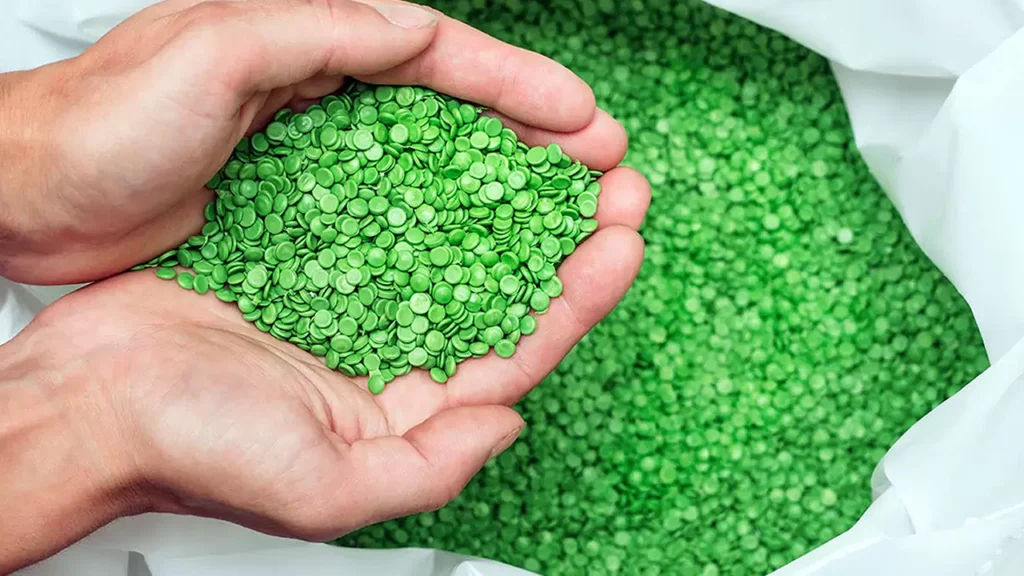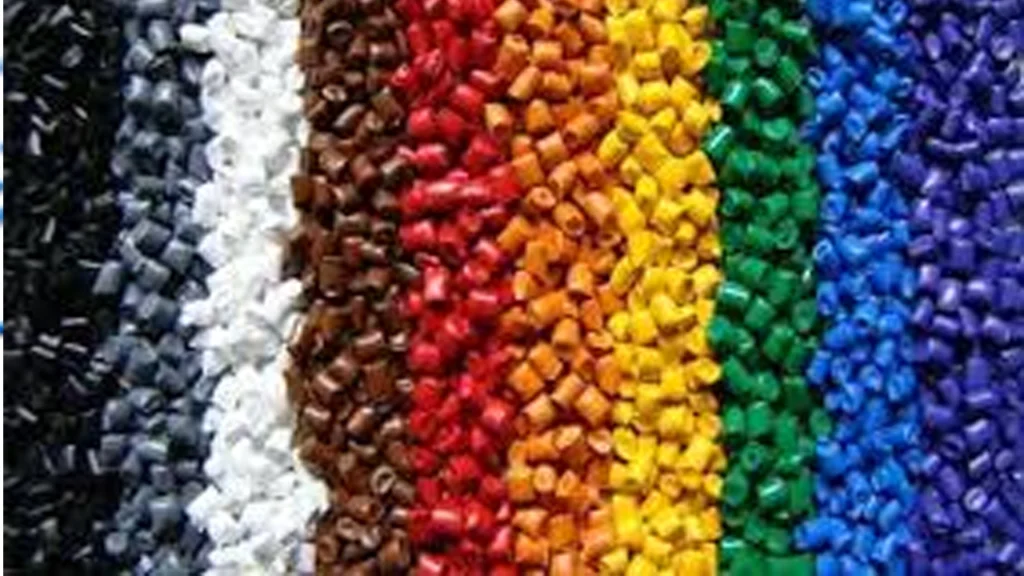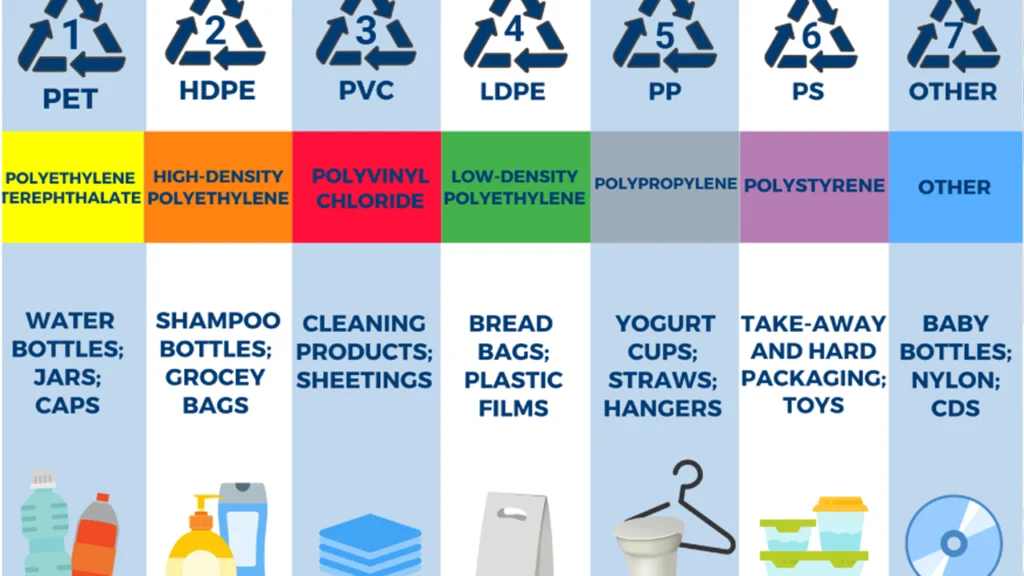Plastic granules, the building blocks of countless products we encounter daily, come in a vast array of types, each with unique properties and applications.
From the water bottle in your hand to the electronics powering your world, plastic granules are the unsung heroes behind these everyday items.
In this post, we will delve into the fascinating world of plastic granules, exploring the different types available and their specific uses. Whether you’re a curious consumer, a budding engineer, or involved in the plastics industry, this comprehensive guide will equip you with the knowledge to understand and appreciate the versatility of these tiny, yet mighty materials.
What Are Plastic Granules

Plastic granules, often referred to as nurdles or resin pellets, are tiny, solid pieces of plastic that serve as the raw material for countless plastic products.
They are typically small, uniform in size, and resemble grains of rice.
These granules are produced by polymerizing liquid monomers into solid plastic. They are then cooled and cut into small pellets.
Think of plastic granules as the building blocks of the plastic world. They are melted down and molded into various shapes and sizes to create the plastic items we use daily.
If you want to learn more about what are Plastic Granules, please click to read this article.
Types of Plastic Granules

Plastic granules serve as fundamental raw materials crucial for manufacturing a wide array of plastic products, each designed with distinct properties and applications. These granules encompass various types:
Polyethylene (PE) Granules:
High-Density Polyethylene (HDPE):
- Description: HDPE is a thermoplastic made from ethylene monomer polymerization. It is known for its high strength-to-density ratio, making it suitable for rigid applications.
- Properties:
- Strength: HDPE is strong and resistant to impact, making it ideal for products like bottles, pipes, and plastic lumber.
- Chemical Resistance: It has excellent resistance to chemicals, making it suitable for containers holding hazardous substances.
- Temperature Resistance: HDPE can withstand varying temperatures, making it suitable for outdoor and industrial applications.
- Common Uses:
- Bottles for milk, detergent, and chemicals.
- Pipes for water and gas distribution.
- Plastic lumber for outdoor decking and fencing.
Low-Density Polyethylene (LDPE):
- Description: LDPE is a thermoplastic made from the polymerization of ethylene monomer. It has a lower density compared to HDPE.
- Properties:
- Flexibility: LDPE is highly flexible and easily moldable, making it suitable for various applications where flexibility is required.
- Moisture Resistance: It has good moisture resistance and can be used in packaging applications.
- Transparency: LDPE is often transparent or translucent.
- Common Uses:
- Plastic bags and films for packaging.
- Squeeze bottles and containers for food and household products.
- Coatings for paper cartons and disposable gloves.
Polypropylene (PP) Granules:
Homopolymer Polypropylene: Provides high stiffness, heat resistance, and chemical resistance, making it ideal for applications such as packaging, automotive components, and medical devices.
Copolymer Polypropylene: Offers improved impact resistance and flexibility compared to homopolymer, suitable for living hinges, food containers, and durable goods like automotive bumpers.
Polypropylene (PP) Granules:
Homopolymer Polypropylene:
- Description: Homopolymer PP is a thermoplastic polymer made from the polymerization of propylene monomer. It is a versatile material known for its high stiffness and heat resistance.
- Properties:
- Stiffness: Homopolymer PP offers high stiffness, which makes it suitable for applications requiring rigidity and strength.
- Heat Resistance: It has good heat resistance, making it suitable for applications where exposure to higher temperatures is expected.
- Chemical Resistance: Homopolymer PP also exhibits good resistance to chemicals.
- Common Uses:
- Packaging applications such as containers and caps.
- Automotive components like bumpers and interior trim.
- Medical devices and laboratory equipment due to its sterilizability and chemical resistance.
Copolymer Polypropylene:
- Description: Copolymer PP is a blend of propylene monomers with other monomers (usually ethylene). This blend enhances certain properties compared to homopolymer PP.
- Properties:
- Impact Resistance: Copolymer PP offers improved impact resistance compared to homopolymer PP, making it suitable for applications where durability and toughness are required.
- Flexibility: It is more flexible than homopolymer PP, allowing for applications requiring living hinges and snap-fit closures.
- Chemical Resistance: Similar to homopolymer PP, copolymer PP exhibits good chemical resistance.
- Common Uses:
- Food containers and packaging where flexibility and impact resistance are important.
- Living hinges in products like flip-top caps and containers.
- Durable goods such as automotive bumpers and battery cases.
Polystyrene (PS) Granules:
General Purpose Polystyrene (GPPS):
- Description: GPPS is a transparent thermoplastic polymer made from the polymerization of styrene monomer. It is known for its clarity and rigidity.
- Properties:
- Transparency: GPPS is clear and allows light to pass through easily, making it suitable for transparent applications.
- Rigidity: It offers good stiffness, which helps maintain the shape of products.
- Brittleness: GPPS can be brittle at room temperature.
- Common Uses:
- Food packaging such as disposable cups, containers, and trays.
- Disposable cutlery and plates.
- CD cases and jewel cases due to their optical clarity.
High Impact Polystyrene (HIPS):
- Description: HIPS is a tougher variant of polystyrene, created by incorporating rubber or other impact modifiers during polymerization.
- Properties:
- Impact Resistance: HIPS offers enhanced toughness and impact resistance compared to GPPS, making it less prone to breakage.
- Versatility: It can be easily molded and shaped, allowing for a wide range of applications.
- Surface Appearance: HIPS typically has a matte surface finish.
- Common Uses:
- Electronics packaging, including TV and computer housings.
- Refrigerator components such as drawers and door liners.
- Automotive interior parts like dashboard components and trim panels.
Polyethylene Terephthalate (PET) Granules:
- Description: PET is a thermoplastic polymer resin of the polyester family. It is synthesized from ethylene glycol and terephthalic acid.
- Properties:
- Transparency: PET is highly transparent, allowing for clear visibility of products packaged within.
- Strength: It is strong and lightweight, providing durability to packaging and products.
- Barrier Properties: PET has excellent barrier properties against moisture, gases, and aromas, which helps in preserving the freshness of packaged goods.
- Recyclability: PET is widely recycled, contributing to its sustainability profile.
- Common Uses:
- Beverage Bottles: PET is the most common plastic used for water and soft drink bottles due to its transparency, strength, and lightweight nature.
- Food Packaging: Used for packaging food items such as sauces, condiments, and ready-to-eat meals due to its barrier properties.
- Textile Fibers: PET is used in textile industry to produce polyester fibers for clothing, carpets, and upholstery.
- Other Applications: Also found in electronic components, automotive parts, and medical devices due to its versatility and suitability for molding into various shapes.
Acrylonitrile Butadiene Styrene (ABS) Granules:
- Description: ABS is a thermoplastic polymer composed of Acrylonitrile, Butadiene, and Styrene. It combines the strength and rigidity of acrylonitrile and styrene polymers with the toughness of polybutadiene rubber.
- Properties:
- Toughness: ABS is known for its toughness, making it resistant to impacts and mechanical stresses.
- Rigidity: It offers good rigidity, which helps maintain its shape under load.
- Impact Resistance: ABS has excellent impact resistance, making it suitable for applications where durability is required.
- Ease of Processing: ABS is easy to process by injection molding, extrusion, and thermoforming.
- Common Uses:
- Automotive parts such as interior and exterior trim components, dashboard panels, and wheel covers.
- Electronics housings and cases for devices like computers, printers, and televisions.
- Consumer goods like LEGO bricks, due to its durability and ease of molding intricate shapes.
Nylon (Polyamide) Granules:
- Description: Nylon is a synthetic thermoplastic polymer known for its toughness, abrasion resistance, and chemical stability.
- Types:
- Nylon 6: Made from caprolactam, it offers good mechanical properties and chemical resistance.
- Nylon 66: Made from hexamethylene diamine and adipic acid, it provides higher strength and heat resistance than Nylon 6.
- Properties:
- High Strength: Nylon granules offer high tensile strength, making them suitable for structural applications.
- Abrasion Resistance: They resist wear and abrasion, making them ideal for gears, bearings, and other moving parts.
- Chemical Stability: Nylon granules are resistant to oils, solvents, and other chemicals.
- Common Uses:
- Automotive components such as engine parts, gears, and bushings.
- Industrial machinery parts like bearings, rollers, and wear-resistant components.
- Apparel and textiles, including sportswear and outdoor gear due to their durability and moisture-wicking properties.
Polycarbonate (PC) Granules:
- Description: Polycarbonate is a transparent thermoplastic known for its exceptional impact resistance and optical clarity.
- Properties:
- Impact Resistance: PC offers outstanding impact resistance, making it suitable for safety applications.
- Optical Clarity: It maintains optical clarity even after molding, suitable for lenses and transparent covers.
- Heat Resistance: PC can withstand high temperatures, which expands its range of applications.
- Common Uses:
- Safety equipment such as safety goggles, face shields, and riot shields.
- Automotive applications including headlamp lenses, interior trim components, and dashboard panels.
- Electronics housings and covers for smartphones, laptops, and LED displays.
Thermoplastic Elastomers (TPE) Granules:
- Description: TPEs are a class of copolymers or blends that combine the properties of elastomers (rubbers) with the processability of thermoplastics.
- Properties:
- Flexibility: TPEs are flexible and stretchable, returning to their original shape after deformation.
- Soft Touch: They offer a soft feel and grip, making them comfortable for touch applications.
- Resilience: TPEs exhibit good resilience and durability, even after repeated stretching.
- Common Uses:
- Automotive seals, gaskets, and weatherstripping due to their sealing properties and durability.
- Medical devices and equipment such as syringe tips, catheters, and surgical instruments.
- Consumer products like grips, handles, and ergonomic tools where comfort and grip are important.
Polyurethane (PU) Granules:
- Description: Polyurethane is a versatile elastomer known for its wide range of hardness and flexibility.
- Properties:
- Versatility: PU can be formulated to be rigid like plastic or flexible like rubber, depending on its application.
- Durability: It offers excellent durability and resistance to abrasion and impact.
- Comfort: PU foams provide cushioning and comfort, used in furniture cushions and mattresses.
- Common Uses:
- Rigid PU: Insulation panels, automotive components, and structural applications requiring durability and stiffness.
- Flexible PU: Footwear, upholstery, and automotive seating where comfort and flexibility are essential.
- Elastomeric PU: Seals, gaskets, and shock-absorbing components in industrial and automotive applications.
These descriptions cover the key properties and typical applications of 7 types Plastic Granules. Each material offers unique characteristics that make them suitable for a wide range of industrial, consumer, and specialty applications.

How to Choose Plastic Granules
Selecting the appropriate plastic granules is crucial for the success of your manufacturing process. The wrong choice can lead to suboptimal product performance, production inefficiencies, and increased costs. Here’s a comprehensive guide to help you make an informed decision:
Understanding Your Requirements
- Product Application: Clearly define the end-use of the product. This will determine the necessary properties of the plastic, such as strength, flexibility, durability, heat resistance, chemical resistance, etc.
- Production Process: Consider your manufacturing method (injection molding, extrusion, blow molding, etc.) and the compatibility of the plastic granules with your equipment.
- Performance Expectations: Specify the desired properties of the final product, including color, finish, and any specific performance standards (e.g., FDA compliance for food contact).
- Cost Considerations: Determine your budget for the plastic granules and any additional costs associated with processing and finishing.
Key Factors to Consider
Resin Type: Choose the resin that best suits your product’s requirements. Common types include:
- Polyethylene (PE): Offers flexibility, durability, and chemical resistance.
- Polypropylene (PP): Known for its stiffness, heat resistance, and good chemical resistance.
- Polystyrene (PS): Provides rigidity, clarity, and ease of processing.
- Polyvinyl Chloride (PVC): Offers versatility, durability, and good weather resistance.
- Other resins like ABS, nylon, polycarbonate, etc., are available for specific applications.
Resin Grade: Different grades within a resin type offer varying properties. Consider factors like impact resistance, heat distortion temperature, flow rate, and additives.
Color and Additives: Select the appropriate colorants and additives to achieve the desired appearance and performance characteristics.
Supplier Reliability: Choose a reputable supplier with a proven track record of delivering consistent, high-quality granules.
Sustainability: Consider the environmental impact of the plastic and opt for recycled or biodegradable options if possible.
Additional Tips
- Testing: Conduct thorough testing to ensure the selected granules meet your product specifications.
- Collaboration: Work closely with your resin supplier to get expert advice and recommendations.
- Certification: Verify that the granules comply with relevant industry standards and regulations.
- Cost Analysis: Compare prices from multiple suppliers, but also consider factors like quality, consistency, and service.
By carefully considering these factors, you can select the optimal plastic granules for your specific application and achieve the desired product performance.
Conclusion
In conclusion, understanding the diverse types of plastic granules available and their respective applications is crucial for making informed choices in various industries.
From versatile polyethylene to durable polypropylene and specialized PVC, each type offers unique properties that cater to specific needs. By carefully selecting the right type of plastic granule and utilizing them effectively, industries can not only meet their manufacturing requirements but also contribute to sustainable practices and environmental responsibility.
As technology advances and demands evolve, continuous research and innovation in plastic granules promise to ensure a brighter future for industry and the environment.
